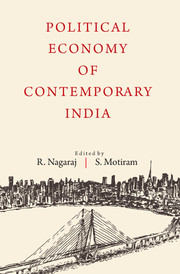Book contents
- Frontmatter
- Contents
- List of Tables and Maps
- List of Figures and Pictures
- Preface
- 1 Introduction: From ‘Intermediate Regime’ to Crony Capitalism
- Economy-wide Considerations
- Political Economy by Regions of India
- 4 Political Economy of a Dominant Caste
- 5 Populism and Party: Society Developmental Regimes in Tamil Nadu and West Bengal
- 6 India's Agricultural Development: A Regional Perspective
- Urban Labour Markets
- Land and Rural Labour
- About the Contributors
- Index
6 - India's Agricultural Development: A Regional Perspective
from Political Economy by Regions of India
Published online by Cambridge University Press: 08 February 2018
- Frontmatter
- Contents
- List of Tables and Maps
- List of Figures and Pictures
- Preface
- 1 Introduction: From ‘Intermediate Regime’ to Crony Capitalism
- Economy-wide Considerations
- Political Economy by Regions of India
- 4 Political Economy of a Dominant Caste
- 5 Populism and Party: Society Developmental Regimes in Tamil Nadu and West Bengal
- 6 India's Agricultural Development: A Regional Perspective
- Urban Labour Markets
- Land and Rural Labour
- About the Contributors
- Index
Summary
Introduction
Regional differences in growth performance have always attracted considerable attention in academic writing as well as in popular imagination. The fact that different regions and nations have followed different growth trajectories is a stylised fact in development economics. What is perhaps more serious is the consideration that such diverse trajectories has resulted in widening the gap between regions in terms of economic and social opportunity of their people. Hence, we need to look closely at how regional differences shape regional inequalities and result in growth processes that are polarising, exploitative and undesirable. While some regions have seen substantial improvements in living standards, backwardness is still concentrated in a few regions. While the indicators of the levels of living in some southern states like Kerala and Tamil Nadu are comparable to many developed countries, those in large, densely populated, northern states like Uttar Pradesh, Rajasthan, Odisha and Madhya Pradesh are closer to that of the poorest parts of the world, such as sub-Saharan Africa (Shankar and Shah, 2012). The concern is also often expressed in scholarly literature that regional inequality in India (in fact, all over the world) has been increasing in recent years and that regions which are already unequal in terms of poverty, income levels, consumption expenditure and access to basic services have further drifted apart over time. To bridge this gap, governments have periodically formulated various policies and direct public investment as an instrument to remedy the situation.
This paper seeks to provide an overview of the regional differences in agricultural growth during the last four decades (1962–2008). It also examines what are the key drivers of regional differentiation in India, the question often asked by many development economists in India (Bharadwaj, 1982). Re-opening this classical question has immense contemporary relevance. The persistence of regional identities and old geographies in spite of the efforts of the nation state towards homogenisation renders a ‘spectral quality’ to their existence (Ludden, 2002). Moreover, one can also argue that the national politics is increasingly getting regionalised (Palshikar, 2006). Regionalisation not only means increasing prominence of regional issues in electoral politics, but also the changing regional composition of the coalition of ruling classes itself.
- Type
- Chapter
- Information
- Political Economy of Contemporary India , pp. 125 - 154Publisher: Cambridge University PressPrint publication year: 2016



